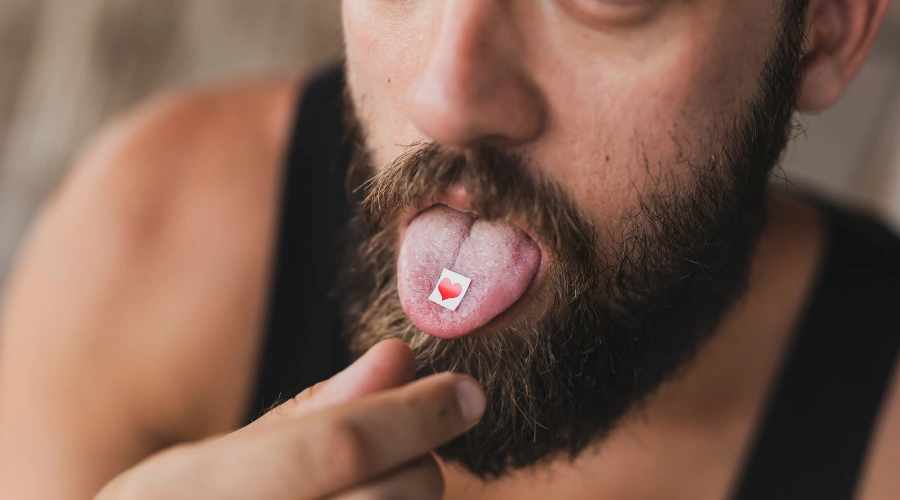The Signs of LSD Overdose, Psychological Effects and Getting Help
Anyone with a substance use disorder knows that they have to be careful not to take too much of any kind of drug. An overdose can be dangerous and lead to irreversible effects or even death. With some newer street drugs, an overdose is harder to pinpoint.
For example, can you OD on acid?
As you (and most people at this point) are aware of, lysergic acid diethylamide (LSD) is a street drug known for its hallucinogenic properties. An ‘overdose on LSD’ often leads to a bad trip with frightening distortions of reality.
You may have some long-term consequences, like serotonin syndrome and hallucinogen persisting perception disorder. However, there doesn’t seem to be a lethal dose of the drug.
South Shores Recovery can help you prevent or overcome the negative effects of an LSD overdose by getting the help you need for drug use. We offer multiple levels of care and comprehensive treatment options for everyone.
Keep reading to learn more about the reality and myths surrounding LSD overdose.
What is Lysergic Acid Diethylamide?
Many people who wonder about the risk of overdosing on acid aren’t quite sure exactly what they might be taking. Lysergic acid diethylamide (LSD) is also known as acid on the streets.
This is a synthetic drug that is most known for its hallucinogenic properties, meant to be taken in small doses ranging from 50 to 150 micrograms.
When you take acid, you might experience a break with reality. It works on your serotonin receptors to alter your perception of reality and create new experiences through your senses.
Keep in mind that there are currently no recognized medical uses for LSD, which means that all forms of it are considered to be illegal drugs.
It’s also important to know that an acid trip can last for several hours. Once you start taking acid, it may be impossible to put the genie back in the bottle. You’ll have to ride the highs and lows of your altered perception and deal with the hallucinogenic effects of LSD, for better or worse.
How Much LSD Counts as an Acid Overdose?

While there are often some pleasant side effects to an acid trip, not all drug use is consistent with these feelings and experiences. LSD use can also contribute to a bad trip. Frightening hallucinations are one possibility that can stay with you for a long time. Bad trips often mean you have taken too much LSD.
But how much acid does it require to have one of these experiences?
On an ordinary basis, most people who take LSD will ingest anywhere from 50 to 150 micrograms. Any dose beyond this point could be considered an overdose. However, every person will react differently to the drug, and 150 micrograms may not have the same negative effects on you.
The good news is that there doesn’t seem to be a lethal dose of LSD, no matter how much you take. It may make you uncomfortable for several hours, and you may seek help for symptoms, but LSD toxicity is rarer than you think.
Signs of an Acid Overdose Beyond a Bad Trip (Dilated Pupils, Vomiting, and More)
Anyone who is considering taking LSD should know the signs of an overdose beyond the unpleasant experience of a bad trip. Substance abuse can trigger issues with other bodily systems that can make you uncomfortable or require medical intervention.
Here are some of the symptoms you may find:
- Dilated pupils
- Hallucinations (both visual hallucinations and auditory hallucinations)
- Confusion
- Difficulty concentrating
- Vomiting
- Seizures
- Difficulty breathing
- High body temperature
If you experience these symptoms while taking lysergic acid diethylamide, you may want to consider seeking emergency medical treatment. They can cause serious consequences if not treated quickly, even though LSD rarely results in death.
Are There Long-Term Effects of LSD Abuse?

Acid and other drugs may have more long-term consequences than you think. They can impact how your body responds to a situation and can affect the chemical balance of the brain.
When you enter your LSD treatment program, you may have to contend with some of these long-term consequences.
Hallucinogen Persisting Perception Disorder
When most people think of drug abuse, they think about the immediate consequences. But few people think about the long-term impact of a massive LSD overdose. One of the primary risks of taking LSD is the potential for hallucinogen persistent perception disorder.
This condition is rare and surfaces weeks or months after your acid trip. When HPPD surfaces, you will experience flashbacks to the effects of the drugs you took. This might mean flashbacks of your visual and auditory hallucinations or your physical symptoms.
Anxiety can spike during this time and can cause serious distress due to your unexpected and distorted sense of reality. All drugs called hallucinogens can trigger this condition, not just acid.
Serotonin Syndrome
Another potentially dangerous consequence of your substance abuse and LSD use could be serotonin syndrome. In this condition, your body releases a flood of the neurotransmitter known as serotonin. It can take place in the minutes and hours after your acid use and can be quite dangerous.
For example, serotonin syndrome can create an altered mental state, increased heart rate, high blood pressure, and issues with the muscular system like tremors, spasms, and loss of coordination.
Oftentimes, this doesn’t happen just as a result of too much LSD. It’s frequently caused by interactions between the acid and other drugs you may take, like selective serotonin reuptake inhibitors used in the treatment of depression. If you experience these symptoms, seek medical intervention quickly.
LSD Treatment Options

Maybe you’re worried that your drug use is going to lead to an overdose on LSD. Or perhaps you are worried that a medical emergency is just around the corner because you rely on drugs to function in day-to-day life.
While an overdose on acid is different from an overdose on Xanax or heroin, it can still be damaging and cause significant distress for some people. And if this sounds familiar, you are in the right place.
No matter your reason, you may need substance abuse treatment.
Here are some of the services you’ll find at South Shores Recovery that can help you with LSD use.
Concurrent Help for Mental Health Disorders and Drug Use
Mental health issues are often one of the leading causes of substance use disorders. People take drugs to make them feel better, to soften the edges of anxiety, or to lift them out of the depths of depression. You’ll be hard-pressed to find a solution to drug use without help for the underlying condition.
South Shores Recovery offers comprehensive assessments so that we can drill into the core of why you take acid. Every person we treat is unique, so we tailor our treatment options to your needs.
We offer proven therapeutic interventions and medication-assisted therapy to get to the bottom of your addiction.
Ability to Transition to Lower Levels of Care
Addiction treatment isn’t a one-size-fits-all program. Most people will start off with inpatient treatment because it gives them the most intensive help for their drug use. You won’t have any opportunity to use drugs again and will be carefully monitored for withdrawal symptoms.
However, some people may not need the intensive help that comes with residential care. They might need more support when they transition out of inpatient treatment. This is why we offer various levels of care for our outpatient treatment programs.
You can spend your days and afternoons with us while practicing your new skills at night. This provides you with the support you need to smooth the transition back to community resources and your loved ones.
Accredited Care for Drug Use in a Proven Program

You don’t want to trust your health and well-being to just anyone. South Shores Recovery offers care accredited by the Joint Commission. This means that we uphold the most stringent qualifications for your comfort and physical safety, starting with OSHA and CMS requirements.
From there, we also met the unique and rigorous requirements set out by the Joint Commission itself.
We’re committed to patient safety and want you to have the best experience possible in our treatment center.
If you abuse LSD and want to know that you’re getting the help you need, trust our proven program. We offer safe and holistic care for a wide variety of issues while maintaining flexibility for the services you truly need.
Get Help for All Forms of Hallucinogens at South Shores Recovery
Even if you can’t overdose on LSD, it may be time to seek help for your drug abuse and mental disorders that contribute to your condition.
South Shores Recovery wants to take those next steps with you so that you don’t have to take powerful hallucinogenic drugs to escape from your day-to-day life.
Our Admissions team can answer any of your questions about LSD usage or other substances you might be taking. We can help you reserve a spot in our treatment program, verify your insurance benefits, and get the help you need as quickly as possible.
Reach out to us today to learn more about how you can stop your drug use in its tracks!
References
- Baquiran M, Keyes D, Al Khalili Y. Lysergic Acid Diethylamide Toxicity. [Updated 2023 Dec 17]. In: StatPearls [Internet]. Treasure Island (FL): StatPearls Publishing; 2025 Jan-. Available from:
- Passie, T., Halpern, J. H., Stichtenoth, D. O., Emrich, H. M., & Hintzen, A. (2008). The pharmacology of lysergic acid diethylamide: a review. CNS neuroscience & therapeutics, 14(4), 295–314.
- Kopra, E. I., Ferris, J. A., Rucker, J. J., McClure, B., Young, A. H., Copeland, C. S., & Winstock, A. R. (2022). Adverse experiences resulting in emergency medical treatment seeking following the use of lysergic acid diethylamide (LSD). Journal of psychopharmacology (Oxford, England), 36(8), 956–964.
- Halpern, J. H., Lerner, A. G., & Passie, T. (2018). A Review of Hallucinogen Persisting Perception Disorder (HPPD) and an Exploratory Study of Subjects Claiming Symptoms of HPPD. Current topics in behavioral neurosciences, 36, 333–360.
- Simon LV, Torrico TJ, Keenaghan M. Serotonin Syndrome. [Updated 2024 Mar 2]. In: StatPearls [Internet]. Treasure Island (FL): StatPearls Publishing; 2025 Jan-. Available from:
- U.S. Department of Health and Human Services. (n.d.). Finding help for co-occurring substance use and mental disorders. National Institute of Mental Health.


Recent Comments